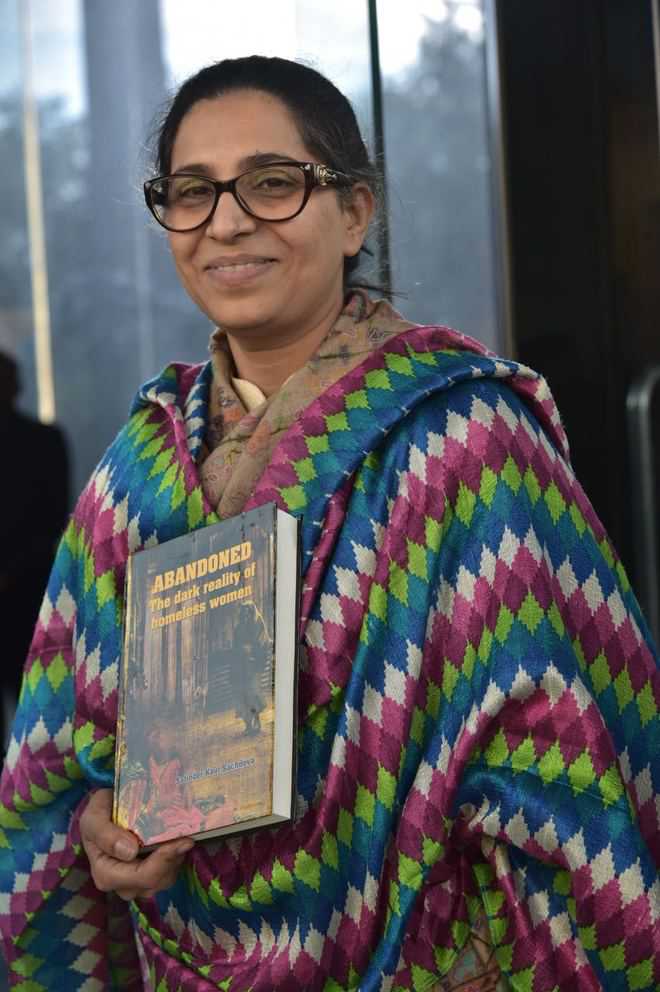
Satinder Kaur Sachdeva
Amarjot Kaur
A 17-year-old inmate at the Short Stay Home in Dhariwal (which was shut down last year) ran and locked herself inside a room when author Satinder Kaur Sachdeva, who penned the book Abandoned—Dark reality of homeless women, offered her chocolates. “She did not come out the entire day and the next day when she saw me there, without chocolates, she hugged me and wept... she later told me that her father, who wasn’t her step-father, would bring her chocolates and molest her. Each time she told her mother about it, she rebuked her, ignored her. Eventually, she was raped by her father,” she says.
As Satinder set out to interview the inmates of five Short Stay Homes in Punjab - Dhariwal, Amritsar, Jalandhar, Chandigarh, and Faridkot - out of which only those in Amritsar and Jalandhar are now operational, there were many other stories of such women that came to the fore, some of whom are post-graduates and professional diploma-holders. “There was a woman, a post-graduate, who was forced to have unnatural sex with her husband and when she denied, she was not only abandoned by her husband but even her parents withdrew support,” shares Satinder.
True inspiration
Mostly, women suffering from physical or mental disabilities, and victims of sexual abuse and assault, were the inmates of these Short Stay Homes. What triggered Satinder to write a book was the alarming difference between the rising number of crimes against women and the scarcity of Short Stay Homes, and the number of inmates in the homes. “There were 20 inmates in Jalandhar, 18 in Dhariwal, 3 in Faridkot and 10 in Chandigarh. Also, it was rather worrisome that the superintendent in Dhariwal was a man. In fact, most of these homes had ad-hoc staffers who stayed there for a brief time. Besides, when I went there to know the case history of inmates, their registers weren’t maintained. They didn’t even maintain the visitor logs,” said Satinder, who would often cloak her identity or her intention to write a book about the inmates when she visited these homes.
“I went there saying that I wanted to use the loo. It was then that I saw that even the basic provisions under the Scheme of Short Stay Home, launched in 1969 by the then Ministry of Human Resource Development, Department of Women & Child Welfare, were not being provided to the inmates. Now, the Scheme of Short Stay Home comes under the Swadhar Scheme, 2013,” she adds.
Not only did Satinder find that the taps and flush weren’t working, even the ceiling of the washrooms was chipping off. “In fact, the location of these homes was in remote areas—like the one in Dhariwal was next to a cycle shop and didn’t even have a gatekeeper or a guard. The walls could be easily trespassed. Also, these homes didn’t clearly list the names of the beneficiaries. Even in Chandigarh’s Nari Niketan, despite having the papers, I was not allowed to go inside. The guards stopped me until I rang up a friend in a reputed newspaper,” she shares.
Future course
While the situation at these homes, according to Satinder, was nothing but deplorable, she has prepared a proposal for the Swadhar Scheme to ensure that these homes accommodate its inmates while adhering to the provisions made in the scheme. “At these homes, there are no counsellors or doctors and most inmates are staying there for more than three years. I feel a room or two, at these homes, which serve as working women hostel, could be better. Also, there needs to be an inter-department strategy that accommodates a tie-up of these homes with recreational centres and libraries. Vocational training too should be imparted to give them basic knowledge of computers,” she suggests.
Of her book, she is honest, “This is not a novel. I was inconsolable each time I interviewed an inmate. It’s a research book and I am a researcher. The language could be wrong here or there, but not the research,” she signs off.



























